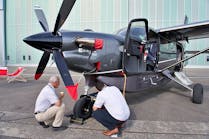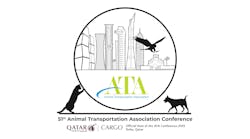Airline Baggage Fees Top $1 Billion for Fifth Straight Quarter
With airlines raking in almost $1.2 billion in baggage fees in the second quarter of 2017 and with major carriers reportedly looking at further fees for carry-on bags and other services, the American Association of Airport Executives (AAAE) has renewed its call for the U.S. airline industry to drop their opposition to a pending bipartisan proposal in Congress to modernize a local airport user fee known as the Passenger Facility Charge (PFC) that finances the construction of new runways, terminals, gates and other airport improvements.
“Why do airlines think a bag fee is good and an airport facility fee is bad? Because one goes in their pocket and the other builds facilities that can increase competition, resulting in lower fares,” AAAE President and CEO Todd Hauptli said. “It’s understandable that the carriers are singularly focused on their bottom lines, but we need policymakers to look past the self-serving arguments of airline executives and take meaningful steps to address airport infrastructure needs by approving the bipartisan proposal in Congress to adjust the antiquated federal cap on local airport user fees.”
According to data released today by the U.S. Department of Transportation's Bureau of Transportation Statistics, airlines collected nearly $1.2 billion in baggage fees during the second quarter of 2017, a new record and the fifth consecutive quarter that bag fees exceeded the billion-dollar threshold. Airlines collected another $737 million in reservation change and cancellation fees during the second quarter.
At the same time the airlines are collecting record baggage fees from their customers, they continue to oppose a modest bipartisan proposal to update the federal cap on local PFCs to $8.50 for originating passengers that was included in the annual funding bill for DOT (S. 1655). That measure, which is strongly supported by AAAE, was approved by the Senate Appropriations Committee July 27 on a unanimous 31-0 vote.
Bag and Ticket Fee Facts
Airlines have collected more than $2.2 billion in bag fees and almost $1.5 billion in reservation change and cancellation fees through the first half of 2017 – an average of more than $20 million per day in combined ancillary fees.
Airlines charged a record $4.2 billion in bag fees and $2.9 billion in ticket fees in 2016, an astounding $7.1 billion.
Since 2008, airlines have charged flyers almost $56 billion in bag and ticket change fees.
Because bag fees are not taxed at the same 7.5 percent excise tax rate applied to base airline tickets, the Airport and Airway Trust Fund lost more than $313 million in foregone revenue in 2016 alone. Since 2008, the $31.2 billion in bag fees that are not taxed have cost the Trust Fund more than $2.3 billion in lost revenue. Those are funds that could have otherwise been spent on needed airport and air traffic control upgrades.
PFC Facts
While airlines raked in more than $7 billion from bag and ticket fees last year, airports collectively received less than $3.2 billion from the PFC in 2016.
Airlines have already charged more bag and ticket fees in the first half of 2017 than airports collected via the PFC in all of 2016.
The PFC is a user charge that must be justified locally, collected locally and used locally on projects approved by DOT to enhance safety, security, or capacity; reduce noise; or increase airline competition.
Despite inaccurate airline claims, the PFC is not a tax and never goes to the federal Treasury, a fact that has been validated by the non-partisan Congressional Research Service.
The federal cap on the PFC has not been adjusted since 2000. The last time the federal cap on local PFCs was increased, a gallon of gas cost around $1.50, and Apple was still more than a year away from releasing its first iPod and seven years from unveiling the first iPhone.

